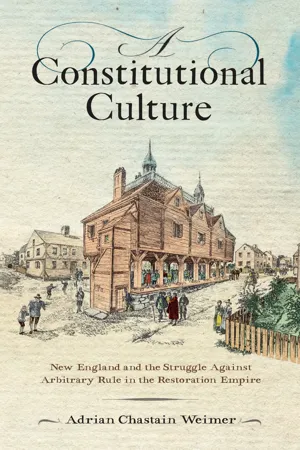
A Constitutional Culture
New England and the Struggle Against Arbitrary Rule in the Restoration Empire
- 456 pages
- English
- ePUB (mobile friendly)
- Available on iOS & Android
A Constitutional Culture
New England and the Struggle Against Arbitrary Rule in the Restoration Empire
About this book
In A Constitutional Culture, Adrian Chastain Weimer uncovers the story of how, more than a hundred years before the American Revolution, colonists pledged their lives and livelihoods to the defense of local political institutions against arbitrary rule.With the return of Charles II to the English throne in 1660, the puritan-led colonies faced enormous pressure to conform to the crown's priorities. Charles demanded that puritans change voting practices, baptismal policies, and laws, and he also cast an eye on local resources such as forests, a valuable source of masts for the English navy. Moreover, to enforce these demands, the king sent four royal commissioners on warships, ostensibly headed for New Netherland but easily redirected toward Boston. In the face of this threat to local rule, colonists had to decide whether they would submit to the commissioners' authority, which they viewed as arbitrary because it was not accountable to the people, or whether they would mobilize to defy the crown.Those resisting the crown included not just freemen (voters) but also people often seen as excluded or marginalized such as non-freemen, indentured servants, and women. Together they crafted a potent regional constitutional culture in defiance of Charles II that was characterized by a skepticism of metropolitan ambition, a defense of civil and religious liberties, and a conviction that self-government was divinely sanctioned. Weimer shows how they expressed this constitutional culture through a set of well-rehearsed practices—including fast days, debates, committee work, and petitions. Equipped with a ready vocabulary for criticizing arbitrary rule, with a providentially informed capacity for risk-taking, and with a set of intellectual frameworks for divided sovereignty, the constitutional culture that New Englanders forged would not easily succumb to an imperial authority intent on consolidating its power.
Frequently asked questions
- Essential is ideal for learners and professionals who enjoy exploring a wide range of subjects. Access the Essential Library with 800,000+ trusted titles and best-sellers across business, personal growth, and the humanities. Includes unlimited reading time and Standard Read Aloud voice.
- Complete: Perfect for advanced learners and researchers needing full, unrestricted access. Unlock 1.4M+ books across hundreds of subjects, including academic and specialized titles. The Complete Plan also includes advanced features like Premium Read Aloud and Research Assistant.
Please note we cannot support devices running on iOS 13 and Android 7 or earlier. Learn more about using the app.
Information
Table of contents
- Cover
- Series Page
- Title Page
- Copyright
- Dedication
- Contents
- List of Abbreviations
- Introduction
- Chapter 1. Shadows: The Memory of Regicide
- Chapter 2. News: Correspondence and Flying Speech
- Chapter 3. Courts: Articulating Sedition and Loyalty
- Chapter 4. Churches: Fast Days as Communal Discernment
- Chapter 5. Frigates: The Arrival of Royal Commissioners
- Chapter 6. Towns: The Resistance Petitions of 1664–1665
- Chapter 7. Propositions: The Testing of New England
- Chapter 8. Boston: The 1665 Negotiations and the Declaration by Trumpet
- Chapter 9. Borderlands: The Contest over Piscataqua, Maine, and Narragansett
- Chapter 10. Crown: Paths to Divided Sovereignty and Charles II’s Response
- Chapter 11. Impressions: Constitutional Legacies
- Conclusion
- Notes
- Index
- Acknowledgments